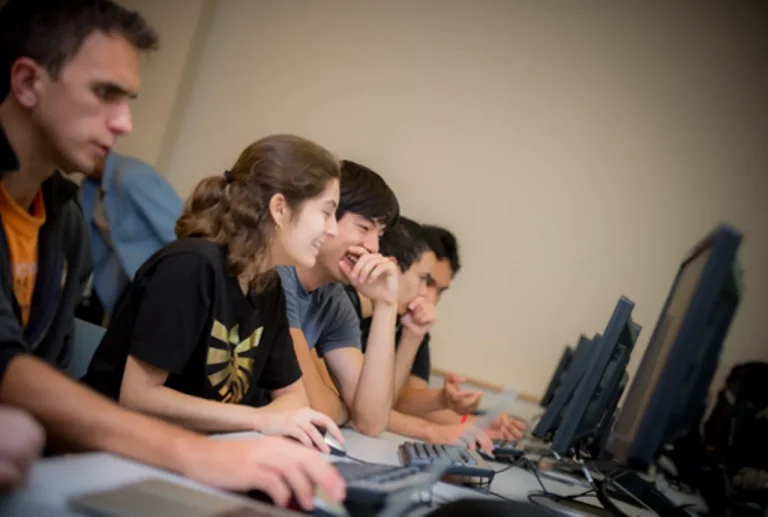Does Computer Science Require Physics?
Physics and computer science are two of the most fundamental scientific fields. While computer science focuses on computation, algorithms, and information processing, physics seeks to understand the natural laws that govern our universe.
So do aspiring computer scientists need to study physics as well? Let’s take a closer look.
If you’re short on time, here’s a quick answer to your question: While physics can provide useful background knowledge, most undergraduate computer science programs do not require physics coursework.
In this approximately 3000 word article, we will examine the connections between physics and computer science and look at reasons you may or may not need physics to pursue a computer science degree and career.
The Connections Between Physics and Computer Science
Physics and computer science may seem like two distinct fields, but they are actually closely intertwined. The principles and concepts of physics have played a significant role in shaping the development of computer science.
From the early days of computing to the latest advancements in artificial intelligence, physics has had a profound impact on the field.
How Physics Has Influenced Computer Science
One of the key ways in which physics has influenced computer science is through the development of quantum computing. Quantum mechanics, a branch of physics, deals with the behavior of matter and energy at the smallest scales.
It has provided the foundation for the development of quantum computers, which have the potential to solve complex computational problems much faster than classical computers.
Furthermore, the laws of physics have influenced the design and architecture of modern computer hardware. For example, the principles of electricity and magnetism are fundamental to the functioning of electronic components such as transistors and integrated circuits.
Understanding these principles has allowed computer scientists to develop more efficient and powerful computing devices.
Overlaps in Computer Science and Physics Research
There are also areas of research where computer science and physics overlap. One such area is computational physics, which involves using computer simulations and mathematical modeling to study physical phenomena.
These simulations can help physicists better understand complex systems and make predictions about their behavior.
Another example is the field of scientific computing, which combines computer science and mathematics to solve scientific problems. Scientists and researchers in various disciplines, including physics, rely on powerful computational tools to analyze and interpret large amounts of data.
This interdisciplinary approach has led to significant advancements in fields such as astrophysics, particle physics, and materials science.
Physics Concepts Relevant to Computer Science
Several concepts from physics are also relevant to computer science. One such concept is entropy, which is a measure of disorder in a system. In computer science, entropy is used in fields such as information theory and cryptography to assess the randomness of data and ensure the security of communications.
Another relevant concept is optimization, which is widely used in both physics and computer science. In physics, optimization techniques are used to find the minimum or maximum values of physical quantities.
In computer science, optimization algorithms are used to solve complex problems and improve the efficiency of algorithms.
Reasons Physics Coursework May Be Useful for Computer Science
Developing Analytical and Problem-Solving Skills
Physics and computer science share a common foundation in mathematics and logic. By studying physics, computer science students can further develop their analytical and problem-solving skills. Physics requires students to think critically, analyze complex systems, and apply mathematical principles to solve real-world problems.
These skills are highly transferable to the field of computer science, where problem-solving and logical thinking are essential for designing efficient algorithms and troubleshooting software issues.
Gaining Insights into Computing Hardware
Understanding the principles of physics can provide computer science students with valuable insights into the inner workings of computing hardware. Physics coursework often covers topics such as electricity, magnetism, and optics, which are directly relevant to the design and operation of computer systems.
Knowledge of these physical principles can help computer scientists optimize the performance of hardware components, design better cooling systems, and develop more energy-efficient technologies.
Preparing for Specialized Fields Like Robotics
For computer science students interested in specialized fields like robotics, physics coursework can be particularly beneficial. Robotics involves the integration of computer science, electronics, and mechanical engineering.
Understanding the principles of physics, such as mechanics and control systems, is crucial for designing and programming robots. By studying physics, computer science students can gain a solid foundation in these areas, enabling them to excel in the field of robotics.
Reasons Physics May Not Be Required for a CS Degree
Computer Science Curricula Focus on Other Topics
When pursuing a degree in Computer Science (CS), students often wonder if they need a strong background in physics. However, many CS programs prioritize other topics that are more directly related to the field.
The curriculum typically includes courses in programming languages, algorithms, data structures, software engineering, and computer architecture. These subjects form the foundation of computer science and are crucial for building a successful career in the field.
While physics can certainly be beneficial in certain areas of CS, it is not a requirement for most CS programs.
Physics Isn’t Needed for Many CS Careers
In the world of computer science, there are numerous career paths that do not require a deep understanding of physics. For example, software development, web development, data analysis, cybersecurity, and artificial intelligence are some of the popular career choices within the CS field.
These roles primarily focus on coding, problem-solving, and utilizing various software tools and technologies. While a basic understanding of physics concepts such as mechanics or electromagnetism can be helpful in certain specialized fields like computer graphics or computational physics, it is not a prerequisite for the majority of CS careers.
Struggling with Physics Could Lower GPAs
One important consideration for CS students is their overall academic performance, particularly their GPA (Grade Point Average). Physics courses can be challenging, requiring a strong mathematical foundation and analytical thinking.
If a CS student struggles with physics, it may negatively impact their GPA, which could potentially hinder their chances of securing internships, scholarships, or even job opportunities. It is essential for CS students to focus on subjects that are directly relevant to their field and where they can excel, rather than spreading themselves too thin across unrelated disciplines.
While physics can be fascinating and interconnected with computer science in certain areas, it is not a mandatory requirement for pursuing a CS degree. The emphasis in CS programs is primarily on coding, algorithms, and problem-solving, which provide the necessary skills for a successful career in the field.
However, it’s always beneficial to have a well-rounded education and to explore interdisciplinary connections between computer science and other fields, including physics, as it can open up unique opportunities in specialized areas of research and development.
When Physics Coursework Is Required for Computer Science
Physics and computer science may seem like two separate fields, but there are areas of overlap where knowledge in both subjects can be beneficial. While not all computer science programs require physics coursework, there are certain situations where it may be necessary.
Graduate Programs in Specialized Fields
For those interested in pursuing graduate studies in specialized areas of computer science, such as computational physics, quantum computing, or simulation and modeling, a background in physics becomes crucial.
These fields require a deep understanding of the physical principles behind computer algorithms and simulations. Without a solid foundation in physics, it can be challenging to grasp the intricacies of these advanced concepts.
In graduate programs focusing on computational physics, students often combine principles from both fields to solve complex problems. They may develop algorithms to simulate physical processes or study the behavior of particles using computational models.
In these cases, a strong background in physics is essential to comprehend the underlying phenomena being simulated or modeled.
Some Undergraduate Programs
While not as common as in graduate programs, some undergraduate computer science programs may require physics coursework or offer it as an elective. This is particularly true for programs that emphasize the intersection of computer science and engineering, such as computer engineering or robotics.
In these programs, understanding the principles of physics can be important for designing and developing hardware components, such as sensors or control systems. Physics coursework can provide students with the knowledge necessary to analyze and manipulate physical systems, which is crucial when designing and implementing computer-controlled devices.
It’s important to note that not all computer science programs require physics coursework. The specific requirements vary across universities and programs. Students interested in pursuing computer science should consult the curriculum of their chosen program or speak with academic advisors to determine if physics coursework is necessary.
Alternatives to Physics for Computer Science Students
Math Coursework
For computer science students who are not interested in studying physics, there are several alternative subjects that can complement their studies. One such alternative is focusing on math coursework. Mathematics plays a crucial role in computer science, as it provides the foundation for algorithms, data structures, and other computational concepts.
By taking advanced math courses such as discrete mathematics, linear algebra, and probability theory, computer science students can develop a strong mathematical background that will enhance their problem-solving skills in programming and algorithm design.
Computer Engineering
Another alternative to studying physics for computer science students is to explore the field of computer engineering. Computer engineering combines elements of both computer science and electrical engineering, focusing on the design and development of computer hardware and systems.
By delving into computer engineering coursework, students can gain a deeper understanding of how computer systems function at a hardware level, including topics such as digital logic design, computer architecture, and embedded systems.
This knowledge can be valuable for computer science students interested in developing software that interacts closely with hardware components.
Electives in Other Sciences
Computer science students can also consider taking electives in other sciences as an alternative to physics. Many universities offer a wide range of science courses that can provide valuable insights and interdisciplinary perspectives.
For example, courses in biology can be beneficial for students interested in bioinformatics or computational biology. Chemistry courses can be useful for students interested in computer simulations or computational chemistry.
Additionally, courses in psychology, sociology, or cognitive science can contribute to the development of human-computer interaction skills, which are essential in user interface design and usability testing.
While physics can provide a solid foundation for computer science, it is not the only path for students to excel in this field. By exploring alternative subjects such as math coursework, computer engineering, and electives in other sciences, computer science students can broaden their knowledge and skillset, ultimately becoming well-rounded professionals in the field.
So, if physics isn’t your cup of tea, don’t worry! There are plenty of other paths you can take to thrive in the exciting world of computer science.
Conclusion
While physics and computer science have many conceptual connections, undergraduate computer science programs rarely require physics coursework. The analytical thinking and hardware insights provided by physics can enrich your computer science studies, but most programs focus on building software engineering skills through math, programming, and data structures coursework instead.
If you struggle with the rigid laws and theories of physics, avoiding it will not necessarily limit your ability to excel as a computer scientist. However, selectively taking some key physics modules can help strengthen your computer science knowledge in fields like quantum computing and robotics.
Evaluate your own interests and academic strengths to decide if optional physics coursework is worth pursuing.







